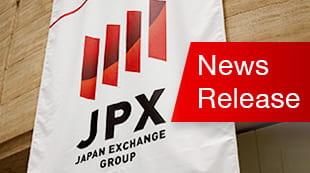Search results 651-660 / 10648
- sort:
- relevance
- latest

Overview (REITs) | Japan Exchange Group REIT The characteristics of REITs Caution Tokyo Stock Exchange REIT Index REITs (Real Estate Investment Trusts) are products which gather capital from a large number of investors, own real-estate assets and return rents, proceeds from sales as dividends to investors. REITs are able to traded on the TSE market (both market orders and limit orders are available) in the same way as stocks. REITs have enabled individuals to invest in real-estate with comparatively low amounts of capital. Listed on Exchanges REITs can be traded on the TSE market through securities companies in the same way as stocks. Internet-trading is also available. Risk Distribution, Real-Estate Management by Professionals Professional real estate manager owns multiple properties in order to diversify investor's risk. Stable dividends, Comparatively High Yields Dividends are produced from the rents of multiple properties, thus stable dividends. In addition, REITs ...

What is TOKYO PRO Market? | TOKYO PRO Market | Japan Exchange Group Overview of TOKYO PRO Market What is TOKYO PRO Market? Professional investors J-Adviser System TOKYO AIM, the previous form of TOKYO PRO Market, was established in June 2009 as a market operated by TOKYO AIM, Inc., which was created as a joint venture between Tokyo Stock Exchange Group, Inc. and London Stock Exchange, based on the provisions for markets for professional investors introduced in the 2008 amendments to the Financial Instruments and Exchange Act. The objectives of TOKYO AIM were to provide new opportunities for financing and advantages other markets could not offer to companies with growth potential in Japan and Asia, to offer new investment opportunities to professional investors at home and abroad, and to revitalize and internationalize the financial market in Japan. TOKYO AIM worked to realize agile and flexible market management by adopting the J-...

Characteristic | Overview (Venture Funds) | Japan Exchange Group What are Venture Funds? Characteristic Method of Utilization Venture Funds market was established on December 3, 2001 as a new market for investment corporations to invest in venture companies especially in unlisted companies. Establish new financial scheme for venture companies Venture funds are new financial scheme for venture companies utilizing investment corporations system (company-type investment trust).It gathers funds from general investors widely and invest in venture companies such as unlisted companies. Provide individual investors with the opportunity of investment in unlisted companies. Generally, venture companies are invested by investment partnership such as the institutional investors. Development of Venture Funds allows low-cost investment and the market where funds are easily-exchangeable enables individual investors to invest in venture companies....

Daily Data (Electricity Futures / LNG Futures) | Japan Exchange Group Contract unit (Electricity Futures) Daily Report of Electricity Futures and LNG Futures (floor/off-floor) Use this file to find the unit of each contract and the “Days Treated as non-weekdays other than TOCOM non-business days” of Electricity Futures. Contract unit (Electricity Futures) (Note) ・The delivery date of electricity futures fiscal year contract shall be the delivery date of each monthly contract based on the positions after cascading. Use this file to find the trading volume and price data of the day for Electricity Futures and LNG Futures by trading types (floor or off-floor). Contents Data Electricity Futures & LNG Futures (floor/off-floor) (Note) ・This report will be updated at around 18:00 JST on each business day. ・"Daily Data(Settlement Price / Trading Volume / Open Interest)" is no longer available at the end of March 2025. TOCOM electricity ...

Overview | Options on JGB Futures | Japan Exchange Group About JGB Futures Flyer Overview Contract Specifications The underlying of Options on JGB Futures is JGB Futures contract. Options buyers could exercise before maturity date (American type). JGB Futures transaction occurs when exercising options (or position being exercised). Risk hedge function Options on JGB Futures providing hedge function to JGB holders against the risk of JGB price fluctuation.Options on JGB Futures providing hedge function to JGB holders against the risk of JGB price fluctuation. Efficiency of asset management Options seller could earn premium. On the other hand, Options buyer could earn same level of profit by smaller money compared to invest JGB. Moreover, institutional investors could do Flexible portfolio management with low cost. Providing new investment tool Options buyer could limit loss to the amount of premium paid even they could get same level of profit by exercising the position or ...

New Listing Guidebook | Japan Exchange Group Segment Transfers The “New Listing Guidebook" for each market explains the approach to listing examinations and procedures at TSE, and also covers segment transfers. New Listing Guidebook...

Initial Listing Criteria (Prime Market) | Japan Exchange Group Initial Requirements Contents of Examination Prime Market Standard Market Growth Market As of April 1, 2023 Items Initial Listing on Prime Market Number of Shareholders (Estimate at Time of Listing) 800 or more Tradable Shares (Estimate at Time of Listing) The number of tradable shares: 20,000 units or more The market capitalization of the tradable shares: JPY 10 billion or more The number of tradable shares: 35% or higher of the listed stocks Market Capitalization (Estimate at Time of Listing) JPY 25 billion or more Amount of Net Assets (Estimate at Time of Listing) The amount of consolidated net assets is JPY 5 billion or more and amount of unconsolidated net assets is a positive figure Profits and Net Sales The applicant company satisfies either of the following a. or b.: Aggregated profits over the last two years are JPY 2....

Examinations pertaining to Disclosure of Corporate Information | Japan Exchange Group Examinations on disclosure of corporate information pursuant to the provisions of Part 2, Chapter 4, Section 2 of the Securities Listing Regulations shall be conducted when Tokyo Stock Exchange (TSE) recognizes their necessity and propriety for the purpose of ensuring appropriate disclosure of corporate information by listed companies. These examinations shall be conducted from the perspectives provided in the following 1. through 5. regarding important corporate information. Whether the time of disclosure is appropriate Whether the disclosed information contains false statements Whether the disclosed information is lacking in information deemed important for investment decisions Whether the disclosed information will cause misunderstandings related to investment decisions Whether the information is lacking in other appropriateness Furthermore, in cases where TSE deems it necessary and conducts an inquiry of a listed company, the listed company is obligated to accurately report such matters immediately. ...

Corporate Information required for Timely Disclosure | Japan Exchange Group Corporate information required for timely disclosure includes information related to the company's business, operations, or performance which has a significant effect on securities investment decisions. Specifically, the following information should be disclosed. Corporate Information Required for Timely Disclosure...

Overview of Timely Disclosure | Japan Exchange Group A financial instruments market functions to contribute to the development of the national economy through the proper and efficient connection of asset management via securities by the public and stable, long-term fund-raising via the issue of securities by companies. In order for a market to fulfill this role, it is vital to maintain investors' confidence in the fairness and soundness of the market, as well as provide appropriate information on securities required for investment decisions. Rules for statutory disclosure (securities registration statement, securities report, quarterly financial reports, etc.) based on the Financial Instruments and Exchange Act and rules for timely disclosure in financial instruments exchanges exist as a means of providing this type of investment information. Timely disclosure rules are established pursuant to the rules of a financial instruments exchange for the purpose of providing investors with important corporate information from ...














